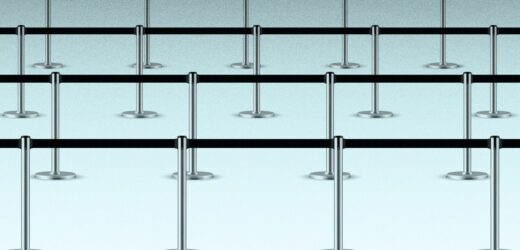Illustration: Gabriella Turrisi/Axios
A pandemic-era record number of people took to the skies over the Fourth of July weekend in the U.S. despite predictions of a hellish few days for air travel.
Driving the news: Nearly 2.5 million people passed through U.S. airport security checkpoints Friday, the most since February 2020.
- Another 2.2 million were screened Saturday and 2.1 million on Sunday.
Why it matters: The air travel system has been struggling with staffing shortages and other issues, making the past few days a big test for airlines, airports and the Federal Aviation Administration.
By the numbers: 26.9% of U.S.-based carriers' arrivals were delayed Friday, per FlightAware, with an average delay of 51 minutes. Another 464 flights were canceled.
- Of major U.S. airlines, JetBlue had the highest delay rate, at 42.7% of its planned Friday flights. Southwest Airlines had 33.8%, while United Airlines and American Airlines both had around 30%.
- Delta Air Lines and American had the highest number of cancellations, at 117 and 113, respectively. That was only around 4% of their total planned flights, however.
Yes, but: Airlines struggled on busy holiday weekends even before the pandemic: Daily delay rates hovered around 20% on the Fourth of July weekend in 2019.
And generally good weather across the U.S. helped prevent major messes this July 4 weekend.
The backstory: Some airlines took extraordinary preemptive measures to manage demand.
- Delta issued an unusual waiver that made it easier for people to rebook their July 4 travel to less busy days.
- American, meanwhile, appears to have dodged a potentially catastrophic bullet: A system error led to pilot and crew staffing shortages for thousands of planned July flights, though the airline says it fixed the problem with minimal schedule disruption.
Some U.S. lawmakers, including Vermont Sen. Bernie Sanders, are calling on Transportation Secretary Pete Buttigieg to penalize airlines for delays and cancellations.
- Airline execs, including Delta CEO Ed Bastian, are in part blaming the FAA, arguing that an air traffic controller shortage is contributing to the ongoing problems.
- But there's only so much the Feds can do here. Buttigieg can't unilaterally force people to work for the airlines and airports to solve staffing shortages, and he can't stop bad weather from causing cascading delays and cancellations across the air travel network.
- He can, however, put his consultant hat back on and offer tips for frustrated flyers.
Be smart: Airports and airlines are also struggling in Europe, Australia and Canada due to staffing issues and worker strikes.
- Plus, the airlines' staffing shortages predate the pandemic. Here's a story I did on the pilot shortage back in 2016.
💬 Alex's thought bubble: Lawmakers missed a once-in-a-lifetime opportunity to reform air travel when they bailed out carriers earlier in the pandemic without incentivizing better on-time performance.
Source: Read Full Article



